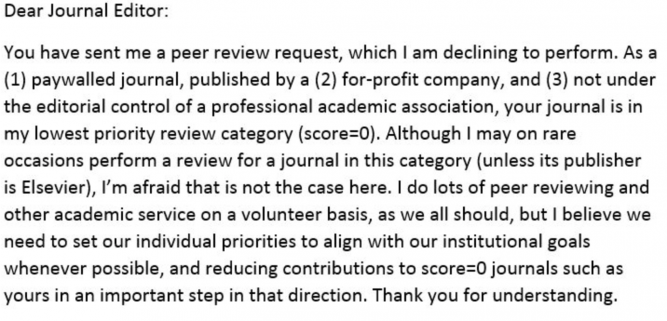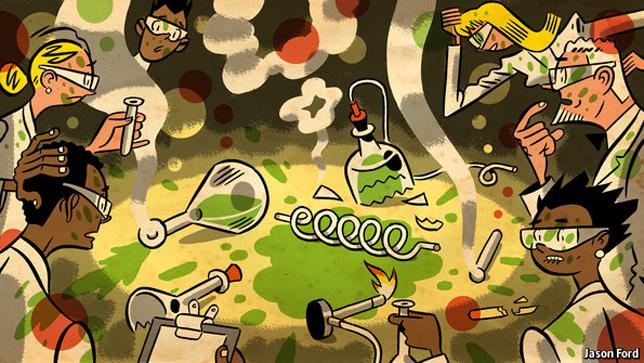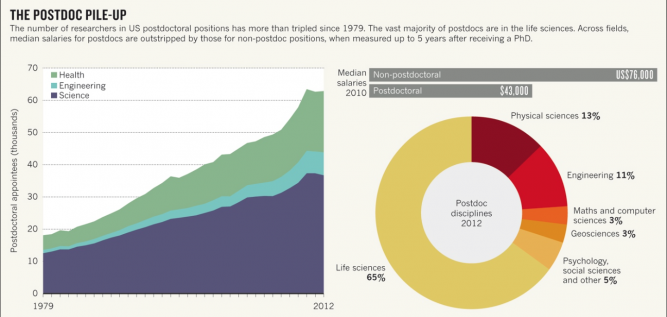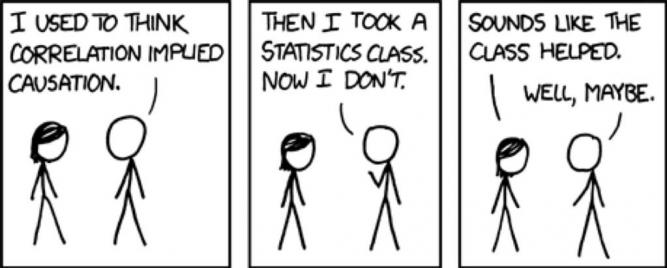Blog Page
Should scientists engage in activism?
In an era of "alternative facts" and pseudo sciencee, it is important that we as scientists stand up for both good science as well as moral science. We cannot ignore the implications of our findings. We have a duty to communicate our results to politicians and the general public to ensure that our research helps those who need it most.
Addressing Biomedical Science’s PhD Problem
And yet another article on the dwindling prospects for a career in academics. If you are going to get a PhD, you really need to ask yourself why. This quote from the article really says it all: “They’re really not ‘alternative’ careers anymore,” says Larry Petcovic of careers services company SciPhD. Rather, for today’s bioscience PhD workforce, “it’s academia that’s the alternative now.”
How to respond to a broken peer review system

Peer Review is in Crisis, But Should be Fixed, Not Abolished
Simply put, peer review is no longer working. After spending months to years submitting, submitting and resubmitting the same paper in order to get it published, one cannot help but become jaded. The constant fight for impact factor is destroying the publication process. It is time for something new.
The Postdoc Crisis
Academics is certainly not an easy career choice - and a post-doctoral position is a bit like trial by fire. It is obvious that everyone who does a postdoc will not be able to have a research career (in either academics or industry). It is just another sign that the acdemic system is broken. If you choose to do a postdoctoral stint, it is smart to be clear on the reasons for doing so - and your subsequent career options....
The future of the postdoc
There is a growing number of postdocs and few places in academia for them to go. But change could be on the way.
Not for love or for money – why do a PhD?
Useful article in The Guardian
"The prestige power of the PhD is however on the wane. With mass education, the number of doctorate holders has increased exponentially, so that the elite membership and the high social status that comes with it is weakened. Especially in connection with a decrease in salary size for university professionals, doctorate holders are perhaps now not seen as exceptional but quirky: why choose to specialize narrowly, work so many hours, and for so little pay when one could get a more lucrative employment elsewhere?"
Rethinking graduate education
A useful editorial by Alan Leshner in Science that highlights the obvious problem that academic science is facing in the training of graduate students. Simply put, the vast majority of students who pass through graduate school will not have careers in academic science. However, the majority of training is focused on academics and other career paths are often considered to be of less value. Clearly unsustainable. All ponzi schemes fail eventually.
"What is needed is a fundamental system analysis and reconfiguration that results in graduate training programs that are better designed to meet the diverse career needs of today's students."
Real Lives and White Lies in the Funding of Scientific Research
‘‘Scientists might have had a Hippocratic oath of their own. They might have promised their gifts to mankind. But instead, I have fathered a race of inventive dwarfs who can be hired for anything.’’— Bertolt Brecht ‘‘The Life of Galileo,’’ version by David Hare
Yet another piece on the broken nature of the academic funding system (link). I have always failed to understand the paradigm of academic science. Extensive resources and many years are spent training an individual to be a researcher - after which they are thrust into a work environment that prevents them from actually performing research. Instead they are forced to spend increasing amounts of time and effort chasing funding to keep the lab functioning. Often as I sit in my office late at night working on yet another grant application, I look around the university and see the legions of administration workers - the majority of whom have permanent postions and higher pay than anything that I can aspire to as an academic. What kind of system fails to either reward or even utilize its most highly trained individuals? It all feels like an immense ponzi scheme that consumes the bright young minds that dream of a career in science.
A man for our season
And as our vineyards, fallows, meads, and hedges,
Defective in their natures, grow to wildness,
Even so our houses and ourselves and children
Have lost, or do not learn for want of time,
The sciences that should become our country. Henry V, V, ii 54-58
An interesting piece on the malaise afflicting science. The point that I find most poignant is that the article was written in 1997 - yet could easily have been written yesterday. What does this say about the ability of the scientific community to address the significant issues facing the very foundation of academic science? Concerns raised almost 20 years ago are if anything even more valid today. Particulary the words "Can politicians be educated to know what science is and to value it for its long-term benefits, rather than putting their trust in the new cult of short-term management?" The answer would unfortunatlely appear to be no.
WHY SO MANY YOUNG SCIENTISTS ARE PUSHED OUT OF ACADEMIA
A rather frank but fair comment on the nature of the PhD process (link). The odds of obtaining an academic appointment are consistenly getting worse. Even if you are one of the lucky few to obtain a position, chances are that you will be expected to cover your own salary, lab expenses including rent, overhead, administrative support etc - with no hope of tenure in sight. A further indication that the academic process is broken??
Unreliable research: Trouble at the lab

For a quantitative reflection of the effects of the current research climate upon the scientific process, look no further than this article in The Economist. We live in an era where the number of publications is more important than the content, or in even being correct. It has become a numbers game where administrators and funding agencies can simply add up the number of papers published and the cumulative impact factors as the sole metric for career advancement and funding. The result is that, accordinlgy to an NIH source, it would be hard to reproduce at least three-quarters of all published biomedical findings. Yet another sign of a broken system....
Here is a link the original article in The Economist
Rescuing US biomedical research from its systemic flaws

It has been clear for quite some time that there are an insufficient number of academic positions available for all of those who want to pursue an academic career. However, another question that is asked less often is how many of those individuals should pursue an academic career. An academic career is clearly not for everyone and nor should it be. The reality is that the majority of PhD students and postdocs will not become PIs at an academic institution. I think that one of the primary problems is that the academic community still pretends that we are only training future academic researchers - and even tends to look down upon those individuals who choose a different career path. This is statistical madness. We know that the odds of anyone from our research group securing an academic position are vanishingly small, yet we continue to pretend that we are only training academics - and that is all that is valued. Clearly the nature of the PhD and postdoctoral experience need to be broadened to encompass the range of career opportunities available to someone with critical thinking skills and analytical training.
Is Higher Education Worth the Price?
Interesting piece from the Economist on the return for investment on higher education. Given the associated costs, perspective students really need to be clear on why they are pursuing higher education.
Rescuing US biomedical research from its systemic flaws

Having an impact (factor)

While a little dated, this is a nice take on the ludicrous nature of the use of impact factors in academics







Leave a message